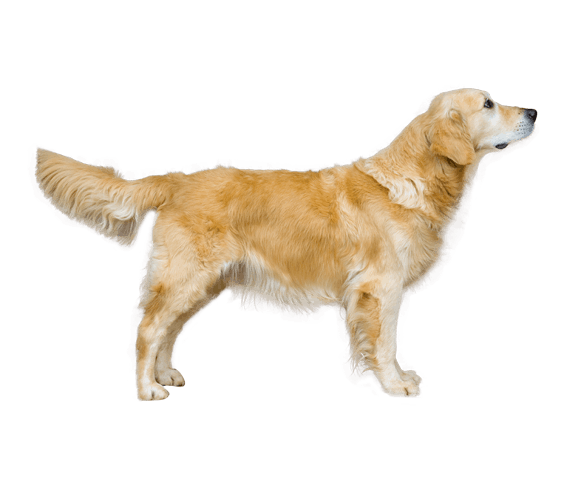Golden Retriever Breed Maintenance
The Golden Retriever can need a lot of looking after – this isn’t a low-maintenance breed. Because it has a double coat (the undercoat is soft and helps to regulate body temperature, the overcoat is water-resistant to offer protection from the elements), a Golden Retriever can be a heavy shedder.
This means they need regular grooming, brushing and bathing. If you don’t brush a Retriever on a weekly basis, its fur will eventually mat; pay particular close attention to the underbody, and where the legs and body meet.
Golden Retriever shedding can occur on a major basis twice a year, so you may need to increase your brushing regime from weekly to daily during this time, or risk seeing little golden hair strands appearing all around your home.
Another thing – Golden Retrievers love to swim, and also love dirt and mud. Don’t be surprised to see yours head straight to the nearest muddy puddle and roll around in it! So, they might need a bath regularly to wash away any dirt and debris. But be warned – a Golden Retriever might consider bathtime an extension of playtime, so be prepared for a bit of chaos. You might need to get into the bath with him or her.
Check your pup’s ears every week or so, to keep them clean and to prevent any possible infections – if your Retriever is in and out of water regularly, this is a risk. Nails should be trimmed every few weeks, or as needed, and maintain good dental hygiene by brushing weekly, at least.
Golden Retriever health risks
The average Golden Retriever lifespan is 10-12 years, so this is a breed that can live a long and happy life. But, like many other dog breeds, there are some health risks that the Retriever is predisposed to. This doesn’t mean your Golden Retriever will suffer some or even any of these issues, but as a responsible pet parent, you should be aware of them – which can include:
- Hip Dysplasia
- Elbow Dysplasia
- Eyesight problems
- Ear infections
- Cancer
If your Golden Retriever had a serious health issue, would treatment for it be covered on your pet insurance? Compare top pet insurance providers in seconds.
Hip Dysplasia
Hip dysplasia is a common issue with Golden Retrievers. It’s a condition where the ball and socket in the hip joint – or both of them – is malformed, so it doesn't function smoothly. It can be painful, restricting movement and making it hard for a dog to get up, climb stairs and generally lead a full, active life. Golden Retrievers can develop hip dysplasia due to genetics.Elbow Dysplasia
A similar issue to hip dysplasia, elbow dysplasia is arthritis of the elbow joint. Golden Retrievers are one of a number of breeds who are prone to it. If your dog moves stiffly after resting or sleeping, or looks to be limping after exercise, it could be suffering from elbow dysplasia.Eyesight problems – including cataracts and glaucoma
The Golden Retriever can suffer a range of eye and vision problems. These include cataracts, when the eye appears cloudy, affecting vision, and glaucoma, when increased pressure in the eye can eventually lead to blindness in the most serious of cases. Retinal dysplasia and retinal atrophy (an inherited condition) are others to be mindful of.
Ear infections
As they are one of many breeds that have floppy ears, the Retriever is at risk of developing ear infections. Its ears aren’t exposed to fresh air as much, and because they’re frequently in water or pushing their heads into wet grass, there’s a chance of trapped moisture leading to a bacterial infection. Check your dog’s ears for debris, and be sure to clean and dry them regularly.Cancer
Sadly, cancer isn’t uncommon with Golden Retrievers, with several studies revealing they develop the disease at higher rates than many other breeds. The four most common types of cancer that affect Golden Retrievers are hemangiosarcoma, mast cell tumors, osteosarcoma and lymphoma. Cancers can be treated, of course, but check your dog regularly for any suspicious lumps.
Feeding a Golden Retriever - what’s the best diet?
Golden Retrievers love their food. On one hand, this makes it straightforward for owners when it comes to dinner time – they’re definitely not fussy eaters. On the other hand, it can be a problem.
Golden Retrievers can get a bit greedy, and they’ll generally be very interested in whatever their humans are eating (as well as their own meals) – so discipline is needed. It can be too easy to give in to those adorable, pleading eyes and share your dinner, but be careful – Golden Retriever weight problems are extremely common. A Retriever won’t often say no to any food offered, so it’s your job to show some control on his or her behalf.
It’s normal to give Golden Retriever puppies a few meals of smaller portions daily, adjusting to their size as they grow. When they reach adulthood, your Retriever will typically be fed twice a day.
We’d recommend choosing a type of dog food that suits your specific breed. A Golden Retriever might need a type of food that offers some benefits for joints – as it’s a breed that can suffer joint-related issues – and there might be other considerations if your Retriever is an active, working dog.
Don’t know where to start? Our partners, Dog Food Advisor, have selected a series of best dog food for Golden Retrievers, including dry, wet and fresh food.






